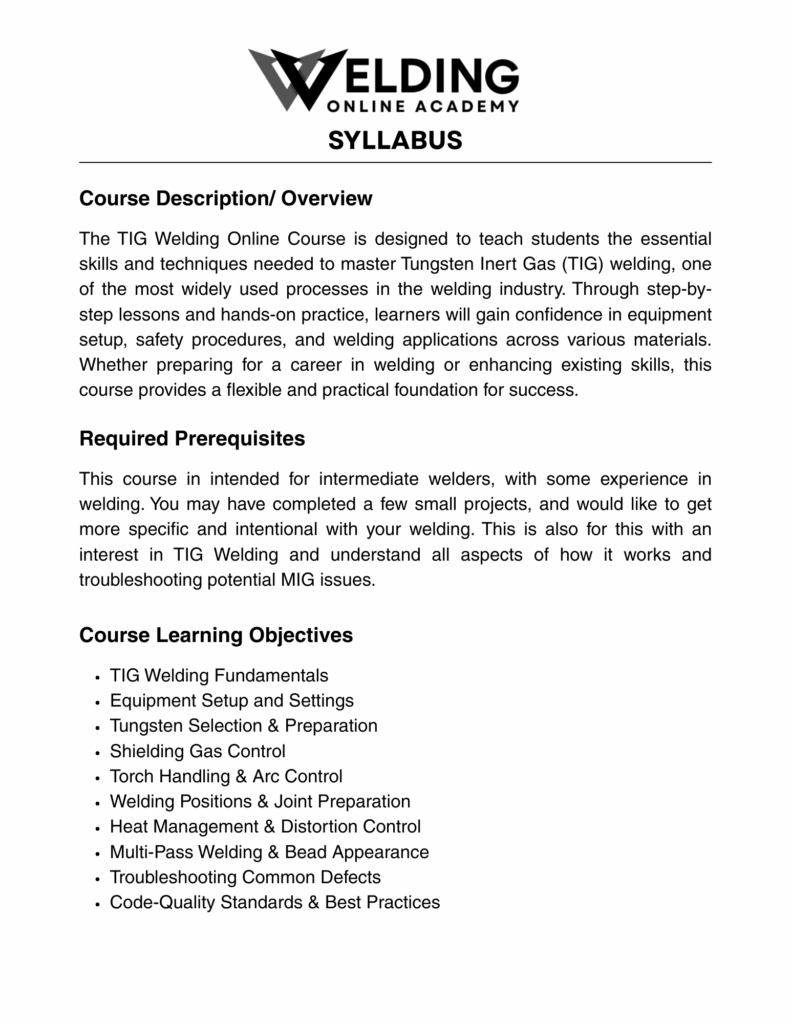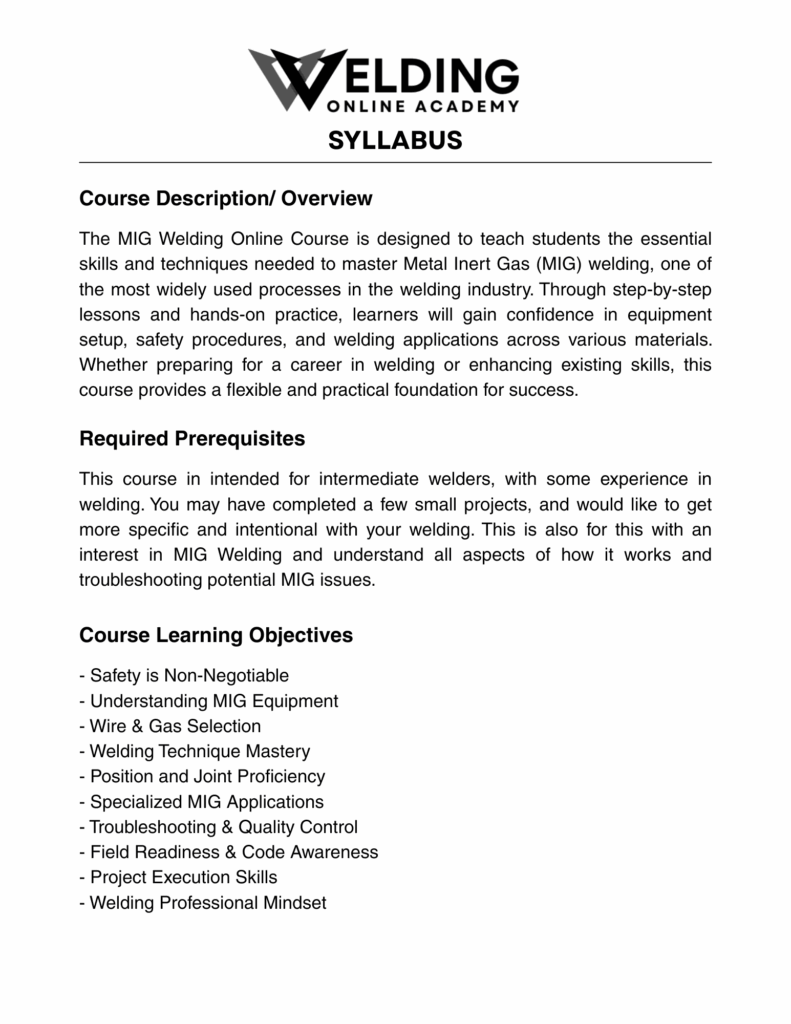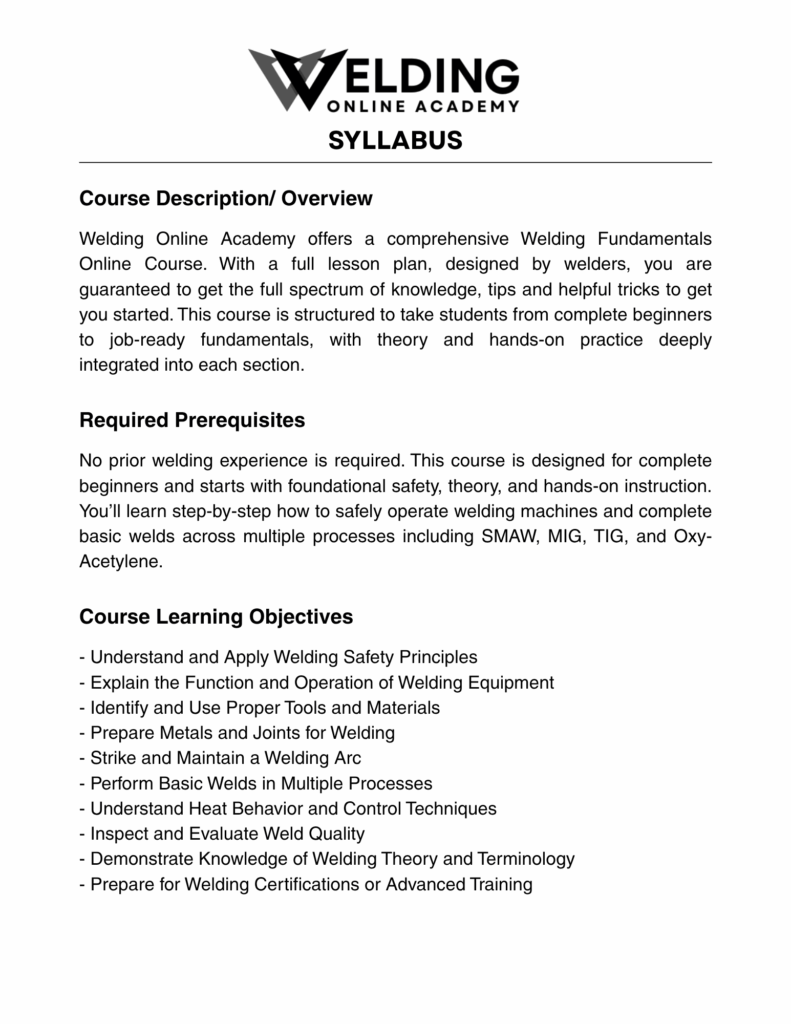One of the most common questions people ask when considering a welding career is: Do you need a diploma to be a welder? The short answer is no—you do not need a high school or college diploma to become a welder. But the longer, more practical answer is: it depends on your goals, location, and how you plan to enter the field.
In this article, we’ll walk you through the realities of becoming a welder in the United States, the role that a high school diploma or GED plays, whether a college degree is required, and how modern options like an online welding course from Welding Online Academy can set you on the fast track to success.
If you’re thinking about welding as a career path, or you’re exploring trade programs that don’t require traditional education, this guide will answer your questions.
Can You Be a Welder Without a High School Diploma?
Legally speaking, you can become a welder without a high school diploma. There are no federal or state laws that prohibit someone without a diploma or GED from becoming a welder. However, that doesn’t mean the path will be the same for everyone.
Here’s the breakdown:
Pros of Starting Without a Diploma:
- You can start sooner—possibly even as a teenager
- You can gain hands-on experience earlier in life
- Some employers value skill over formal education
Challenges:
- Some employers may require a GED or high school diploma for entry-level positions
- Certification programs and apprenticeships might ask for basic educational qualifications
- Career advancement could be limited in highly regulated industries
That said, many welders begin their careers without diplomas and gain credibility through experience and certifications alone. In fact, with platforms like Welding Online Academy, you can learn to weld online and prepare for certification exams without ever setting foot in a traditional classroom.
Do You Need a College Degree to Be a Welder?
Absolutely not. Welding is a skilled trade, not an academic profession. While some technical colleges and trade schools offer welding associate degrees, they are by no means mandatory to enter the field.
In many cases, a welding certification from a reputable program—even an online one—is more than enough to land a job and start earning.
Welding Certifications That Matter More Than a Degree:
- AWS (American Welding Society) Certified Welder
- ASME Boiler & Pressure Vessel Code certifications
- NCCER Welding Certification
All of these can be prepared for through an online welding certification prep course, like the one offered by Welding Online Academy, and then taken at a certified testing facility.
How to Become a Welder Without a Diploma
So, if you don’t have a high school or college diploma, how can you become a welder?
Step 1: Take an Online Welding Course
Online welding schools like Welding Online Academy allow you to learn to weld online in days, and prepare you for certification exams with structured, professional training. You can complete the program at your own pace from anywhere in the U.S.
Visit Welding Online Academy to explore their course catalog and get started.
Step 2: Practice the Skills
While the theory and safety knowledge can be learned online, you’ll need hands-on practice. You can:
- Purchase or rent a home welding kit
- Use a workshop or garage
- Volunteer with local tradespeople to get real-world experience
Step 3: Get Certified
With preparation from your online course, you can schedule your certification test at a local accredited testing center. Most employers care more about certification than education credentials.
Step 4: Apply for Entry-Level Jobs or Apprenticeships
Even without a diploma, many companies will hire welders who are certified, skilled, and motivated. Entry-level job titles include:
- Welder Helper
- Apprentice Welder
- Welding Assistant
Once you gain field experience, you can move into higher-paying roles like:
- Pipe Welder
- Fabricator
- Welding Inspector
Why an Online Welding Course Is the Best Starting Point
Traditionally, people attended local trade schools or community colleges to learn welding. While these are still valid paths, they come with drawbacks:
- Fixed schedules that don’t work for full-time workers or parents
- High tuition costs
- Commutes and classroom commitments
Online welding courses eliminate those barriers. Programs like the one at Welding Online Academy are designed specifically for people who want to start quickly, affordably, and flexibly.
Advantages of Online Welding Certification Training:
- Learn from anywhere on your own time
- Fast-track certification with focused lessons and mock exams
- Step-by-step welding tutorials that simplify even complex techniques
- Cost-effective compared to trade schools
- Support from experienced instructors
Whether you have a diploma or not, you can start your welding career online right now.
Real Talk: Will Not Having a Diploma Hold You Back Long-Term?
In the beginning, not having a high school diploma may mean fewer opportunities. But once you’re certified and have experience, welding is a merit-based profession—employers care more about what you can do than what school you graduated from.
Over time, as you build your portfolio, earn certifications, and take on more complex jobs, your lack of a diploma will become less and less relevant.
If you ever want to return and complete a GED later, that option is always open—but it doesn’t have to stop you from launching your welding career today.
High-Demand Welding Careers You Can Enter Without a Diploma
Some of the most in-demand welding careers that don’t require diplomas include:
- Structural Welder: Working on buildings, bridges, and other frameworks
- Pipe Welder: Specializing in pipelines and oil infrastructure
- Fabrication Welder: Manufacturing metal parts and assemblies
- Underwater Welder: With additional training and certification
- Welding Inspector: For experienced professionals with certification
Many of these can be entered after completing an online welding certification prep course, getting hands-on practice, and passing your certification test.
What Employers Are Really Looking For
Forget the myth that a diploma is the ticket to a welding job. In reality, employers want:
- Safety Knowledge: Can you follow proper procedures?
- Technical Skills: Can you create clean, strong welds?
- Certification: Have you passed any industry-standard tests?
- Reliability: Do you show up and do the work?
- Willingness to Learn: Are you open to new techniques and feedback?
These traits can all be demonstrated through your work, not your school records. The best way to build these qualities is through a structured program like Welding Online Academy, where you’re guided from beginner to job-ready.
Final Thoughts: Education Is Flexible—Skill Is Key
So, do you need a diploma to be a welder? Technically, no. Practically, it helps—but it’s not a deal breaker. Especially not with the wealth of online welding courses available today.
The welding industry is built on skill, discipline, and results. With the right training, you can become a welder regardless of your academic background.
If you’re ready to take control of your future, build something with your hands, and enter a career that offers real stability, start today with the online welding certification prep course from Welding Online Academy.
Learn at your pace. Get certified. Start welding.
Visit https://www.weldingonlineacademy.com to enroll now.
FAQ: Do You Need a Diploma to Be a Welder?
Do I need a high school diploma to become a welder?
Legally, no—there are no federal or state laws requiring a diploma or GED to become a welder. However, some employers, apprenticeships, or training programs may prefer or require basic educational qualifications.
Is a college degree required for welding jobs?
No. Welding is a skilled trade. While some schools offer associate degrees, most entry-level roles focus on proven skills and industry certifications rather than academic degrees.
Which welding certifications matter most to employers?
Commonly recognized credentials include AWS Certified Welder, ASME Boiler & Pressure Vessel Code certifications, and NCCER Welding Certification—typically earned through testing at accredited facilities after training.
How can I become a welder without a diploma?
Follow a practical path: take an online welding course to learn safety and theory, practice hands-on with basic equipment or in a workshop, schedule certification testing at an accredited center, then apply for entry-level roles or apprenticeships.
Will not having a diploma limit my welding career long-term?
Early on, some opportunities may be limited. Over time, welding is merit-based—strong skills, certifications, reliability, and a willingness to learn matter most and can outweigh formal academic credentials.



